| Listing 1 - 10 of 21 | << page >> |
Sort by
|
Book
ISBN: 1282860305 9786612860300 0773570047 Year: 2002 Publisher: Montreal : McGill-Queen's University Press,
Abstract | Keywords | Export | Availability | Bookmark
 Loading...
Loading...Choose an application
- Reference Manager
- EndNote
- RefWorks (Direct export to RefWorks)
Based on interviews with Leamington greenhouse growers and migrant Mexican workers, Tanya Basok offers a timely analysis of why the Seasonal Agricultural Workers Program is needed. She argues that while Mexican workers do not necessarily constitute cheap labour for Canadian growers, they are vital for the survival of some agricultural sectors because they are always available for work, even on holidays and weekends, or when exhausted, sick, or injured. Basok exposes the mechanisms that make Mexican seasonal workers unfree and shows that the workers' virtual inability to refuse the employer's demand for their labour is related not only to economic need but to the rigid control exercised by the Mexican Ministry of Labour and Social Planning and Canadian growers over workers' participation in the Canadian guest worker program, as well as the paternalistic relationship between the Mexican harvesters and their Canadian employers.

ISBN: 0801440106 9780801440106 0801488087 9780801488085 Year: 2002 Publisher: Ithaca Cornell University Press
Abstract | Keywords | Export | Availability | Bookmark
 Loading...
Loading...Choose an application
- Reference Manager
- EndNote
- RefWorks (Direct export to RefWorks)
Brazilians --- Foreign workers, Brazilian --- Japan --- Ethnic relations.
Book
Year: 2002
Abstract | Keywords | Export | Availability | Bookmark
 Loading...
Loading...Choose an application
- Reference Manager
- EndNote
- RefWorks (Direct export to RefWorks)
Foreign workers --- Working poor --- Industrial safety --- Industrial hygiene --- Health and hygiene --- Business & economics --- Technology & engineering
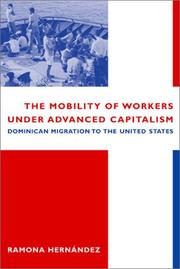
ISBN: 0231116233 0231116225 0231505183 Year: 2002 Publisher: New York Columbia University Press
Abstract | Keywords | Export | Availability | Bookmark
 Loading...
Loading...Choose an application
- Reference Manager
- EndNote
- RefWorks (Direct export to RefWorks)
What explains the international mobility of workers from developing to advanced societies? Why do workers move from one region to another? Theoretically, the supply of workers in a given region and the demand for them in another account for the international mobility of laborers. Job seekers from less developed regions migrate to more advanced countries where technological and productive transformations have produced a shortage of laborers. Using the Dominican labor force in New York as a case study, Ramona Hernández challenges this presumption of a straightforward relationship between supply and demand in the job markets of the receiving society. She contends that the traditional correlation between migration and economic progress does not always hold true. Once transplanted in New York City, Hernández shows, Dominicans have faced economic hardship as the result of high levels of unemployment and underemployment and the reality of a changing labor market that increasingly requires workers with skills and training they do not have. Rather than responding to a demand in the labor market, emigration from the Dominican Republic was the result of a de facto government policy encouraging poor and jobless people to leave-a policy in which the United States was an accomplice because the policy suited its economic and political interests in the region.
Foreign workers, Dominican --- Capitalism --- Travailleurs étrangers dominicains --- Capitalisme --- United States --- Etats-Unis --- Emigration and immigration --- Emigration et immigration --- Travailleurs étrangers dominicains --- Buitenlandse arbeiders [Dominicaanse ] --- Emigration and immigration. --- Alien labor, Dominican --- Dominican foreign workers --- Immigration
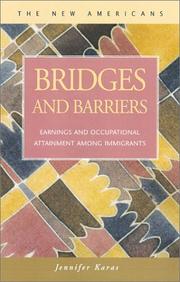
ISBN: 1931202168 9786610361465 1280361468 1931202885 9781931202886 9781280361463 9781931202169 Year: 2002 Publisher: New York LFB Scholarly Pub. LLC
Abstract | Keywords | Export | Availability | Bookmark
 Loading...
Loading...Choose an application
- Reference Manager
- EndNote
- RefWorks (Direct export to RefWorks)
BUSINESS & ECONOMICS --- Labor --- Foreign workers --- Immigrants --- Business & Economics --- Labor & Workers' Economics --- Economic conditions --- Economic conditions. --- Alien labor --- E-books --- Aliens --- Foreign labor --- Guest workers --- Guestworkers --- Immigrant labor --- Immigrant workers --- Migrant labor (Foreign workers) --- Migrant workers (Foreign workers) --- Employees --- Employment --- Noncitizen labor --- Noncitizens
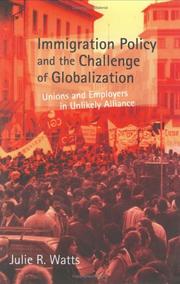
ISBN: 1501717057 9781501717055 0801439388 9780801439384 Year: 2002 Publisher: Ithaca, NY : Cornell University Press,
Abstract | Keywords | Export | Availability | Bookmark
 Loading...
Loading...Choose an application
- Reference Manager
- EndNote
- RefWorks (Direct export to RefWorks)
After years of internal debate, labor union leaders have come to regard immigration as an inevitable consequence of globalization. Labor leaders have come to believe that restrictive immigration policies, which they once supported to protect their native constituencies, do little more than encourage illegal immigration. As a result, most labor leaders today support more open policies that promote legal immigration, creating an unconventional, unspoken partnership with employers. Julie R. Watts identifies globalization as the impetus behind the change in labor leaders' attitudes toward immigration. She then compares specific political, economic, and institutional circumstances that have shaped immigration preferences and policies in France, Italy, Spain, and the United States. In addition to revealing the unusual alliance between unions and employers on the immigration issue, Watts examines the role both groups play in the formulation of national policy.
Labor unions. --- Foreign workers. --- Emigration and immigration --- Industrial unions --- Labor, Organized --- Labor organizations --- Organized labor --- Trade-unions --- Unions, Labor --- Unions, Trade --- Working-men's associations --- Labor movement --- Societies --- Central labor councils --- Guilds --- Syndicalism --- Alien labor --- Aliens --- Foreign labor --- Guest workers --- Guestworkers --- Immigrant labor --- Immigrant workers --- Migrant labor (Foreign workers) --- Migrant workers (Foreign workers) --- Employees --- Government policy. --- Employment --- Noncitizen labor --- Noncitizens --- Mondialisation --- Syndicats --- Travailleurs etrangers

ISBN: 0312294948 Year: 2002 Publisher: New York : Palgrave Macmillan,
Abstract | Keywords | Export | Availability | Bookmark
 Loading...
Loading...Choose an application
- Reference Manager
- EndNote
- RefWorks (Direct export to RefWorks)
Labor unions --- Foreign workers --- Syndicats --- Travailleurs étrangers --- History --- Histoire --- France --- United States --- Etats-Unis --- Emigration and immigration --- Government policy --- Emigration et immigration --- Politique gouvernementale
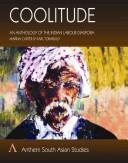
ISBN: 1283377551 9786613377555 1843313677 9781843313670 9781283377553 9780857287601 0857287605 6613377554 1843310031 9781843310037 1843310066 9781843310068 Year: 2002 Publisher: London: Stylus publishing,
Abstract | Keywords | Export | Availability | Bookmark
 Loading...
Loading...Choose an application
- Reference Manager
- EndNote
- RefWorks (Direct export to RefWorks)
A deconstruction of the stereotypical depictions of the coolie in the British Empire.
East Indians --- East Indian diaspora. --- Foreign workers, East Indian. --- Indic literature --- Alien labor, East Indian --- East Indian foreign workers --- Diaspora, East Indian --- Human geography --- Relocation of East Indians --- Removal of East Indians --- Resettlement of East Indians --- Race relations --- Segregation --- East Indians in foreign countries --- East Indian diaspora --- Relocation. --- History and criticism. --- Diaspora --- Migrations --- Resettlement --- Khal, --- Torabully, Khaleel, --- Torabully, K. --- Torabully, Khal, --- Exiles in literature

ISBN: 1860646727 1860646719 Year: 2002 Publisher: London Tauris
Abstract | Keywords | Export | Availability | Bookmark
 Loading...
Loading...Choose an application
- Reference Manager
- EndNote
- RefWorks (Direct export to RefWorks)
Migration. Refugees --- Labour market --- Emigration and immigration --- Foreign workers --- Emigration et immigration --- Travailleurs étrangers --- Economic aspects. --- Aspect économique --- 325 --- Landverhuizing. Kolonisatie. Immigratie. Emigratie --(politiek) --- 325 Landverhuizing. Kolonisatie. Immigratie. Emigratie --(politiek) --- Travailleurs étrangers --- Aspect économique
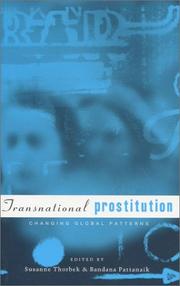
ISBN: 1842770314 9781842770313 Year: 2002 Publisher: London : Zed books,
Abstract | Keywords | Export | Availability | Bookmark
 Loading...
Loading...Choose an application
- Reference Manager
- EndNote
- RefWorks (Direct export to RefWorks)
Prostitution. --- Women alien labor. --- Sex tourism. --- Women foreign workers. --- Law --- Sociology of work --- Demography --- Sociology of the family. Sociology of sexuality --- Denmark --- Netherlands --- Canada --- Sweden --- Germany --- Thailand --- Spain --- Australia --- Men --- Migration --- Sex work --- Attitudes --- Sex industry --- Legislation --- Book
| Listing 1 - 10 of 21 | << page >> |
Sort by
|

 Search
Search Feedback
Feedback About UniCat
About UniCat  Help
Help News
News